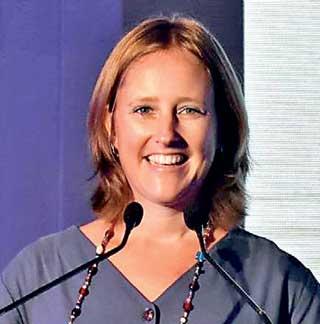[ad_1]
In an effort to create a competitive operative environment, the embassy of the Kingdom of Netherlands took the initiative this week to bring Responsible Business Conduct (RBC) to the forefront in Sri Lanka.
|
Deputy Ambassador of Embassy of the Kingdom of the Netherlands Anouk Baron addresses gathering in Colombo during RBC handbook launch |
Facilitated by Citra Social Innovation Lab of the United Nations, the Netherlands embassy launched on Thursday the ‘Addendum on RBC Handbook on Doing Business
in Sri Lanka’.
RBC, as defined by the OECD Guidelines for Multinational Enterprises, revolves around the key principle of due diligence, which means the responsibility of businesses to identify, prevent, mitigate and report on risks related to their operations, products and services.
The handbook was launched as the Netherlands embassy acknowledges the importance of creating a conversation around RBC in the island nation.
The Handbook on Doing Business in Sri Lanka provides guidance on RBC for entrepreneurs and businesses. Adhering to RBC standards is critical for exporters from Sri Lanka to the European Union (EU) and the Netherlands to stay competitive and retain access to the EU markets.
The Addendum compiles essential information to understand RBC, the frameworks and actions supporting it, as well as step-by-step guidance on incorporating RBC in business operations and practices, managing risks and accessing tools, guidelines and relevant information.
“To survive and build a better future, the era of bigger is better, take, make, dispose and exponential growth should be replaced with a greater focus on quality, sustainability and a move towards understanding what footprint or impact a business creates throughout its entire supply chain.
“We have a choice, an opportunity but also an obligation to collectively deliver on that demand as citizens, consumers, producers and policymakers,” said Deputy Ambassador of the Embassy of the Kingdom of the Netherlands Anouk Baron, during the launch event
held in Colombo.
Highlighting the role of the Government of Sri Lanka, Sustainable Development Council Director General Chamindry Saparamadu stated that efforts have been taken to prioritise the private sector and a framework of private sector engagement on sustainability has been developed.
One of the main elements of this framework is promoting inclusive and sustainable business models through standardisation, certification
and reporting.
“Given that the Sri Lankan economy is predominantly based on SMEs, our approach is to see an industry-wide adoption of all these standards in a phased out approach to ensure a wider adoption of these standards,”
said Saparamadu.
[ad_2]
Source link

